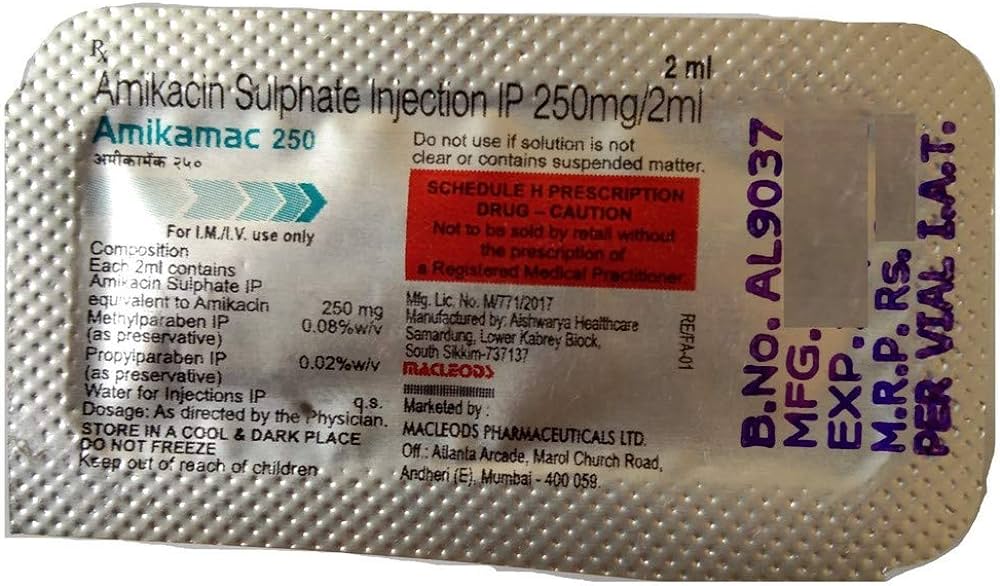AMIKAMAC 250MG INJECTION 1 VIAL
KEY BENIFITS,
- Effective Against Severe Infections: Amikamac 250mg injection is highly effective against a wide range of severe bacterial infections, including those that are resistant to other antibiotics.
- Broad Spectrum Activity: It exhibits activity against both Gram-positive and Gram-negative bacteria, making it suitable for various types of infections.
- Hospital-Acquired Infections: Amikamac 250mg injection is commonly used to treat infections acquired in hospital settings, including those occurring in intensive care units.
- Respiratory Tract Infections: It can be used to treat respiratory tract infections such as pneumonia and bronchitis.
₹50.50
CompareProduct Introduction:
Amikamac 250mg injection is a medication containing amikacin sulfate as its active ingredient. It falls under the category of antibiotics known as aminoglycosides. This injection is primarily used to treat severe bacterial infections caused by susceptible strains of bacteria.
Amikamac 250mg Injection works by stopping the growth of bacteria. It is given as a drip (intravenous infusion) or as an injection directly into a vein or a muscle under the supervision of a healthcare professional and should not be self-administered. It should be used regularly at evenly spaced time intervals as prescribed by your doctor. Do not skip any doses and finish the full course of treatment even if you feel better. Stopping the medicine too early may lead to the infection returning or worsening.
Common side effects of this medicine include injection site reactions and increased blood urea. Consult your doctor if any of these side effects persist or if your condition does not improve despite treatment.
Some patients receiving high doses may develop balance disorder (loss of balance), kidney damage, and hearing loss. Therefore, please follow all the instructions given by your doctor while using this medicine. Your doctor may also monitor you with regular kidney function tests, hearing tests, and urine tests during treatment. This medication is not recommended for use during pregnancy. Inform your doctor if you are pregnant, planning to conceive, or breastfeeding.
Benefits:
- Effective Against Severe Infections: Amikamac 250mg injection is highly effective against a wide range of severe bacterial infections, including those that are resistant to other antibiotics.
- Broad Spectrum Activity: It exhibits activity against both Gram-positive and Gram-negative bacteria, making it suitable for various types of infections.
- Hospital-Acquired Infections: Amikamac 250mg injection is commonly used to treat infections acquired in hospital settings, including those occurring in intensive care units.
- Respiratory Tract Infections: It can be used to treat respiratory tract infections such as pneumonia and bronchitis.
Side Effects:
Common side effects of Amikamac 250mg injection may include:
- Nausea and vomiting
- Diarrhea
- Dizziness
- Headache
- Injection site reactions (pain, redness, swelling)
- Ringing in the ears (tinnitus)
- Kidney damage (especially with prolonged use or high doses)
- Hearing loss (especially with prolonged use or high doses)
Usage Guidelines:
- Amikamac 250mg injection is administered by healthcare professionals via intravenous (IV) or intramuscular (IM) route.
- The dosage and duration of treatment depend on the type and severity of the infection, as well as the patient’s age, weight, and renal function.
- It is important to complete the full course of treatment as prescribed by the doctor, even if symptoms improve before the medication is finished.
- Do not self-administer this medication. It should only be given by healthcare professionals in a healthcare setting.
- If a dose is missed, patients should contact their healthcare provider for instructions on when to receive the next dose.
Drug Interactions:
- Amikamac 250mg injection may interact with other medications, including but not limited to:
- Other antibiotics, especially those with potential nephrotoxicity or ototoxicity
- Diuretics (water pills)
- Nonsteroidal anti-inflammatory drugs (NSAIDs)
- Patients should inform their doctor about all medications they are currently taking, including prescription drugs, over-the-counter medicines, vitamins, and herbal supplements, to avoid potential interactions.
- Regular monitoring of renal function and hearing is recommended, especially with prolonged use or high doses of Amikamac 250mg injection.
It is essential for patients to consult with a healthcare professional or pharmacist for personalized advice regarding the usage, benefits, side effects, and interactions of Amikamac 250mg injection.
SAFETY ADVICE

Alcohol

Pregnancy

Breast feeding

Driving

Kidney

Liver
| Weight | 0.5 kg |
|---|---|
| Dimensions | 10 × 10 × 10 cm |
Related products
-
Medicines
A Ret HC Cream 15gm, Advanced Formula Skin Care with Hydroquinone (2% w/w), Tretinoin (0.05% w/w) and Hydrocortisone (1% w/w)
 Medicines
MedicinesA Ret HC Cream 15gm, Advanced Formula Skin Care with Hydroquinone (2% w/w), Tretinoin (0.05% w/w) and Hydrocortisone (1% w/w)
0 out of 5(0)MARKETERA. Menarini India Pvt LtdSALT COMPOSITIONHydroquinone (2% w/w) + Tretinoin (0.05% w/w) + Hydrocortisone (1% w/w)STORAGEStore below 25°CKey Features & Benefits
- Superior Blend: A combination of Hydroquinone (2% w/w), Tretinoin (0.05% w/w) and Hydrocortisone (1% w/w) offering a multiplicative benefits.
- Diverse Usage: It can be used to gain relief from skin darkening (hyperpigmentation), acne, and inflammatory skin conditions.
- Long-lasting: A little goes a long way! The 15gm tub offers extended usage even with regular use.
SKU: n/a


